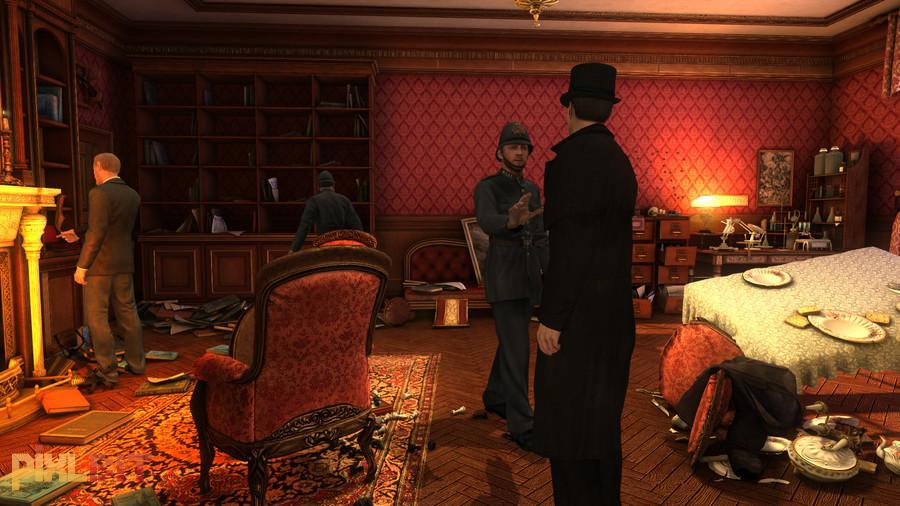I think I dodged a bullet here. If I had played this one after reviewing Red Johnson's Chronicles I may have had to hang myself.
The Testament of Sherlock Holmes Review
|
|
See PixlBit's Review Policies

On 10/25/2012 at 07:54 AM by Daniel Iverson Holmes' best adventure yet still isn't very good. |

Only diehard fans of Sherlock Holmes or classic adventure games need apply.
European developer Frogwares has spent much of the past decade building a company around Sherlock Holmes, releasing eight adventure games featuring the iconic character since 2002. No developer knows Holmes better than Frogwares, and it's safe to say its latest offering, The Testament of Sherlock Holmes, is the most ambitious yet.
Unfortunately that's the highest compliment that can be given.
After solving the tutorial case of a stolen pearl necklace, Holmes is accused of returning a fake necklace to a client. He brushes off the claim against him, begins a hasty and seemingly unrelated investigation into the murder of a local bishop, and increasingly exhibits behavior unusual even by Holmes standards. Over time, the people of London begin to doubt him because he is either unable or unwilling to prove his innocence.
Testament is a dark interpretation of Sir Arthur Conan Doyle's great detective. Within the first hour of the game, you'll examine a mutilated corpse and a severed appendage. And still, nothing disturbed me more than the unintentionally creepy children who frame the story by discovering the journal in which beloved sidekick Dr. John H. Watson documented the events of the game.
The story is reasonably interesting, but it is worth noting Frogwares' Holmes is arrogant without the charm or wit of Doyle's (or Downey Jr.'s, for that matter), which may cause heartburn for fans of the character.
Sometimes the game allows you to choose Holmes' responses with a simple BioWare-style dialogue wheel—but then you discover it's all smoke and mirrors because you must choose all of the options before you can proceed anyway. It's the first of several disappointing reminders about how much stronger the game could be with a few different design choices.
For the most part, gameplay follows a pattern of visiting a new area, searching every nook and cranny for clues, solving puzzles, and then returning to 221B Baker Street to analyze the clues and determine the next move.
The game offers three options for exploring the environment, each with a different perspective and control scheme. I'm partial to first person because it offers the widest range of vision and best allows you to step into Holmes' shoes.
Searching new areas for clues is reasonably fun but also brings to light another disappointing design choice. Sometimes I would notice something interesting but was unable to click it until after I found something else, I guess because logically Holmes wouldn't be searching for it yet even though it was obvious to me.
While you search for clues, you can use the "Sixth Sense" ability to identify important spots you might've missed. Unfortunately, this ability is rarely useful because finding clues is actually one of the easier parts of the game. Determining with virtually no direction what the game expects you to do before it allows you to advance is the hard part, and Holmes is short the crystal ball required to help.
Imagine being asked to solve a Rubik's Cube without ever being told the objective of the puzzle is to rotate the blocks until all sides are a solid color. The challenge and fun of the puzzle is to achieve this objective, not to guess what the objective is in the first place.
That's how a lot of the puzzles in Testament work: you're presented with the puzzle but offered little or no direction regarding its mechanics or your objective. For example, one puzzle early on tasks you with opening a safe by inserting pegs into holes on a grid. Filling one hole sometimes removes a peg you've already inserted into another hole. Why? Who knows.
The in-game instructions are rarely helpful either. In another example, Holmes indicates to Watson he needs to analyze the clues. Attempting to do so with no success, I click the instructions icon hoping to receive more direction about the mechanics of the analysis. "Analyze the clues," it says. Thanks.
The game also introduces meaningless barriers to progress. In still another example, I was assigned the simple task of retrieving a book and placing it on a desk. I found the book fairly quickly but then spent five or so minutes trying to find the right desk, only to discover it was the first desk I tried, but I hadn't properly "equipped" the book before clicking it.
And thus a pattern emerges: Instead of being clever and genuinely challenging, much of the game is difficult for all the wrong reasons.
Once you've finished exploring an area and collecting evidence, you end up at the deduction board. The deduction board lists the facts of the case and asks you to deduce relationships and draw conclusions to dictate the next move.
The deduction board is neat because it gives you insight into how Holmes would interpret clues, but more often than not I disagreed with the game's logic, which either means logic isn't my strong suit or the game doesn't provide enough information to reach the conclusions it expects you to reach—and who am I to dispute the great Sherlock Holmes?
Despite its flaws, Testament deserves credit where credit is due. While character animation is definitely a weakness, the graphics are otherwise strong with well designed and highly detailed environments to explore.
Although not for lack of trying, Testament falls short of being more than a forgettable adventure game with a famous protagonist. Diehard Holmes fans might enjoy the experience, but as a more casual fan, I'd much rather grab my Doyle collection from the bookshelf and read a story, where I know all that is required to advance is turning the page.















Comments